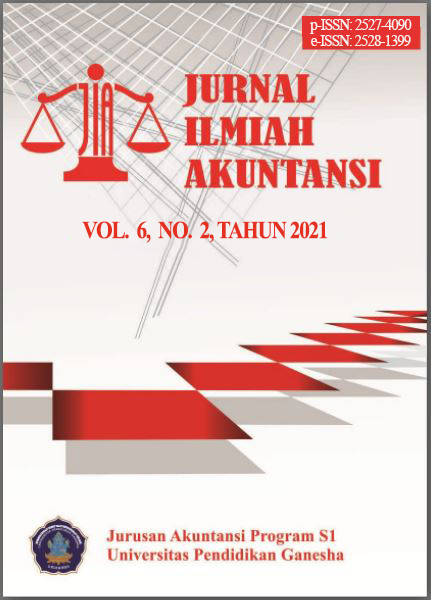Factors Affecting Earnings Management of Islamic Banking Companies at the Indonesia Stock Exchange on Publication Year of 2013-2019
DOI:
https://doi.org/10.23887/jia.v6i2.36717Keywords:
Institutional Ownership, Managerial Ownership, Individual Ownership, Foreign Ownership, Board of CommisionairsAbstract
This research was conducted on Islamic banking listed on the Indonesia Stock Exchange from 2013-2019 using secondary data. A saturated data analysis is used in this research. The sample is all Sharia banking companies as many as 12 companies. The results show that Institutional Ownership, Managerial Ownership, Individual Ownership, Foreign Ownership, and the Board of Commissioners have an effect on Earnings Management. Meanwhile, State Ownership, Family Ownership, Public Ownership, Public Accountants, Audit Committee, and Board of Directors have no effect on Earnings Management. Simultaneously all independent variables have an effect on Earnings Management. Given their findings, the authors propose that the practical implication of this research is that earnings management does not occur much in Islamic banks listed on the Indonesian Stock Exchange Earnings Management in the study of Islamic Business Ethics is in the form of deliberate fraud or fraud to achieve certain interests and its nature is not for the benefit of the people or society so it is not allowed because it will have an impact on the survival of the company. But interests that are in a precarious condition that endanger the interests of the public or the state, such as a pandemic outbreak, are allowed because the country is experiencing an economic downturn.
References
Achmad, T. (2008). Concentrated Family Ownership Structures Weakening Corporate Governance: A Developing Country Story, The Case of Indonesia Companies. Jurnal Manajemen Akuntansi & Sistem Informasi, 8(2), 118–134.
Adrian, S. (2011). Good Corporate Governance. Sinar Grafika.
Aryani, W., & Raharja, S. (2011). Mekanisme Corporate Governance Dan Manajemen Laba Melalui Manipulasi Aktivitas Riil.
Azib, Harahap, D. A., & Amanah, D. (2020). The manufacturing company performance : The effect of internationalization and funding decision. International Journal of Research in Business & Social Science, 9(4), 220–227.
Azim, M. I. (2012). Corporate Governance Mechanisms and Their Impact on Company Performance: A Structural Equation Model Analysis. Australian Journal of Management, 37(3), 481–505.
Boediono, G. S. (2005). Kualitas Laba: Studi Pengaruh Mekanisme Corporate Governance dan Dampak Manajemen Laba dengan Menggunakan Analisis Jalur. Simposium Nasional Akuntansi VIII.
Chung, K. H., & Zhang, H. (2011). Corporate governance and institutional ownership. Journal of Financial and Quantitative Analysis, 46(1), 247–273.
Deng, Y., Morck, R., Wu, J., & Yeung, B. (2015). China’s pseudo-monetary policy. Review of Finance, 19(1), 55–93.
Douma, S., George, R., & Kabir, R. (2011). Foreign and Domestic Ownership, Business Groups and Firm Performance: Evidence from a Large Emerging Market. SSRN Electronic Journal.
Effendi, S., & Daljono. (2013). Pengaruh Corporate Governance Dan Kualitas Auditor Terhadap Manajemen Laba. Diponegoro Journal of Accounting, July, 811–824.
Ermiati, C., Amanah, D., Agustini, F., Putri, C. R. N., & Harahap, D. A. (2020). Kinerja Keuangan Bank Umum Syariah Di Indonesia Periode 2016-2019. Jurnal Ilmiah Manajemen Dan Bisnis, 5(2), 1–10.
Ferdawati. (2010). Pengaruh Kepemilikan Mangerial dan Kepemilikan institusional Terhadap Managemen Laba Real. 4(1), 55–67.
Ghozali, I. (2012). Aplikasi Analisis Multivariate dengan Program IBM SPSS 20 (6th ed.). Badan Penerbit Universitas Diponegoro.
Hartini, M. . (2017). State-Owned Enterprises : a Comparison Between the UK, Japan, and Malaysia. International Journal of Economics, Commerce and Management, 5(2), 114–130.
Iqbal, A. S. J. & M. (2012). Analisis Perbandingan Kinerja Keuangan Perbankan Konvensional Dan Perbankan Syariah. Journal of Management : Small and Medium Enterprises (SMEs), 7(2), 337–359. https://doi.org/10.35508/jom.v11i1.2319
Jussila, I., Tarkiainen, A., Sarstedt, M., & Hair, J. F. (2015). Individual Psychological Ownership: Concepts, Evidence, and Implications for Research in Marketing. The Journal of Marketing Theory and Practice, 23(2), 121–139.
Latif, A. Y. M. & A. B. (2010). Earnings Management Dalam Tinjauan Etika bisnis Islam. Jurnal Dinamika Ekonomi Dan Bisnis, 7(2), 1–22.
Lidyah, R. (2018). Islamic Corporate Governance, Islamicityfinancial Performance Index And Fraudat Islamic Bank. Jurnal Akuntansi, 22(3), 437–453.
Mousa, G. A., & Desoky, A. (2019). The effect of dividend payments and firm’s attributes on earnings quality: Empirical evidence from Egypt. Investment Management and Financial Innovations, 16(1), 14–29.
Muliasari, I., & Dianati, D. (2014). Manajemen Laba dalam Sudut Pandang Etika Bisnis Islam. Jurnal Akuntansi Dan Keuangan Islam, 2(2), 157–182. https://doi.org/10.35836/jakis.v2i2.47
Nicholson, Gavin & Newton, C. (2010). The Role of the Board of Directors: Perceptions of Managerial Elites. Journal of Management and Organization, 16(2), 201–218.
Panda, B., & Leepsa, N. M. (2017). Agency theory: Review of theory and evidence on problems and perspectives. Indian Journal of Corporate Governance, 10(1), 74–95. https://doi.org/10.1177/0974686217701467
Pearce, J. A., & Zahra, S. A. (2007). Board composition from a strategic contingency perspective. Journal of Management Studies, 29(4), 411–438.
Pratiwi, Y. D., & Meiranto, W. (2013). Pengaruh Penerapan Corporate Governance Terhadap Earnings Management Melalui Manipulasi Aktivitas Riil. Diponegoro Journal of Accounting, July, 867–871.
Pujiningsih, A. I. (2011). Pengaruh Struktur Kepemilikan, Ukuran Perusahaan, Praktik Corporate Governance Dan Kompensasi Bonus Terhadap Manajemen Laba.



1.png)


